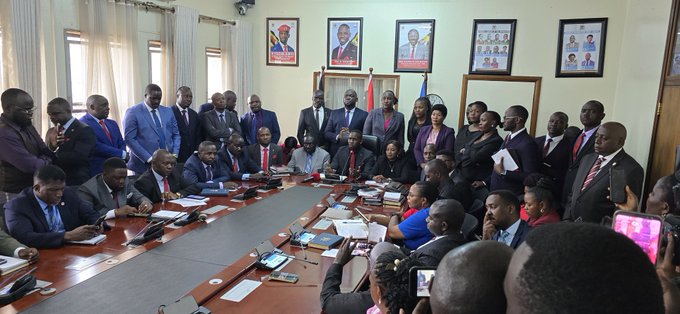UPDF Bill Passage: MP Kakande Criticizes LoP Ssenyonyi’s Walkout As Strategic Blunder
Kampala|FileFactsUg

Masaka City Woman MP, Juliet Kakande, has criticized Leader of the Opposition in Parliament (LoP) Joel Ssenyonyi’s decision to order opposition MPs to walk out of Parliament during the passage of the contentious UPDF (Amendment) Bill, 2025.
Speaking on Sanyuka TV’s Morning Express show on May 21, 2025, Kakande asserted that Ssenyonyi’s move was a grave mistake that would have far-reaching consequences for the nation.
On May 20, 2025, Parliament passed the UPDF (Amendment) Bill, which authorized the return of the trial of civilians in military courts, despite significant opposition from civil society, legal experts, and opposition MPs, some of whom drafted a minority report making a strong case against the bill.
“I am disappointed in the LoP’s leadership,” Kakande said, “by ordering us to walk out, we missed the opportunity to challenge the poisonous bill on the floor of Parliament and make our voices heard. Instead, we gave the government a free pass to pass a bill that undermines our Constitution and the rule of law.”
Kakande argued that the bill is unconstitutional and would undermine the doctrine of separation of powers, and she contends that if the opposition had remained in Parliament, many contentious clauses, such as those allowing the trial of civilians in military courts—a practice outlawed by the Supreme Court in January 2025—could have been defeated on the floor with the minority report signed by 14 MPs, but they were passed without any resistance.
“No one from the opposition supported this [UPDF] bill or says it is good, but is this the right way we are going to handle matters? Should Ugandans believe that every controversial law justifies [our] walking out? Should opposition MPs always walk out whenever there is disagreement on the matter?” Kakande asked.
She compared LoP Ssenyonyi’s approach to that of NRM’s Museveni, who leads MPs on decrees regarding what to do to pass draconian laws in his favor.
“We always accuse Museveni of summoning NRM MPs to instruct them on what to do, but it is sad that, as the opposition, we agree on decisions, but they end up moving on individual decisions without consensus, yet they are counterproductive to the opposition and the people,” Kakande said.
She expressed her concern about the fact that LoP Joel Ssenyonyi directed them to walk out of Parliament before the debate on the UPDF (Amendment) Bill even began.
She noted that the same approach was taken during the controversial coffee debate, where the Government rationalized it to the mother ministry, which had a significant impact on the coffee sector.
She asserted that Ssenyonyi’s tactic, which undermines any debate by the opposition on contentious bills from the NRM regime, allows Museveni to push his harmful laws through Parliament without facing any opposition.
She provided an example of a clause that aimed to try anyone caught wearing red attire in military courts, which was approved with an amendment introduced by Kampala Central’s Muhammad Nsereko stating that for anything to qualify as a military store, it must bear a military logo under the passed bill.
“Imagine one person [MP] was able to fight and defeat an equally bad clause of the law; what would have happened if we had all our legal experts on the floor of Parliament with the backing of an extensive minority report?” Kakande asked.
The minority report, signed by 14 opposition MPs on May 20, 2025, outlined several grounds for dissent, including the contravention of the Constitution, specifically Article 92, which restricts retrospective legislation.
Kakande emphasized that by walking out, the opposition missed the opportunity to highlight the bill’s many flaws.
“Instead, we were forced to watch as the government pushed through a bill that will give President Museveni’s regime more power to try civilians in military courts. As MPs, we were elected while in opposition, and we came in to fight for change. We can only do that while inside the parliamentary chambers, not in media houses’ studios or social media platforms,” Kakande said.
